The second International Scientific and Practical Conference “Artificial Intelligence and Spiritual Culture” was held at the Plekhanov Russian University of Economics on October 23. At the conference, Prof. Evgeny N. Pashentsev, DSc (History), Chief Researcher at St. Petersburg State University, and Prof. Eleonora V. Barkova, DSc (Philology), Professor of the Department of History and Philosophy at Plekhanov Russian University of Economics, moderated the panel “Artificial Intelligence in Strategic Communication of the BRICS Countries in the Conditions of Global Crisis.”
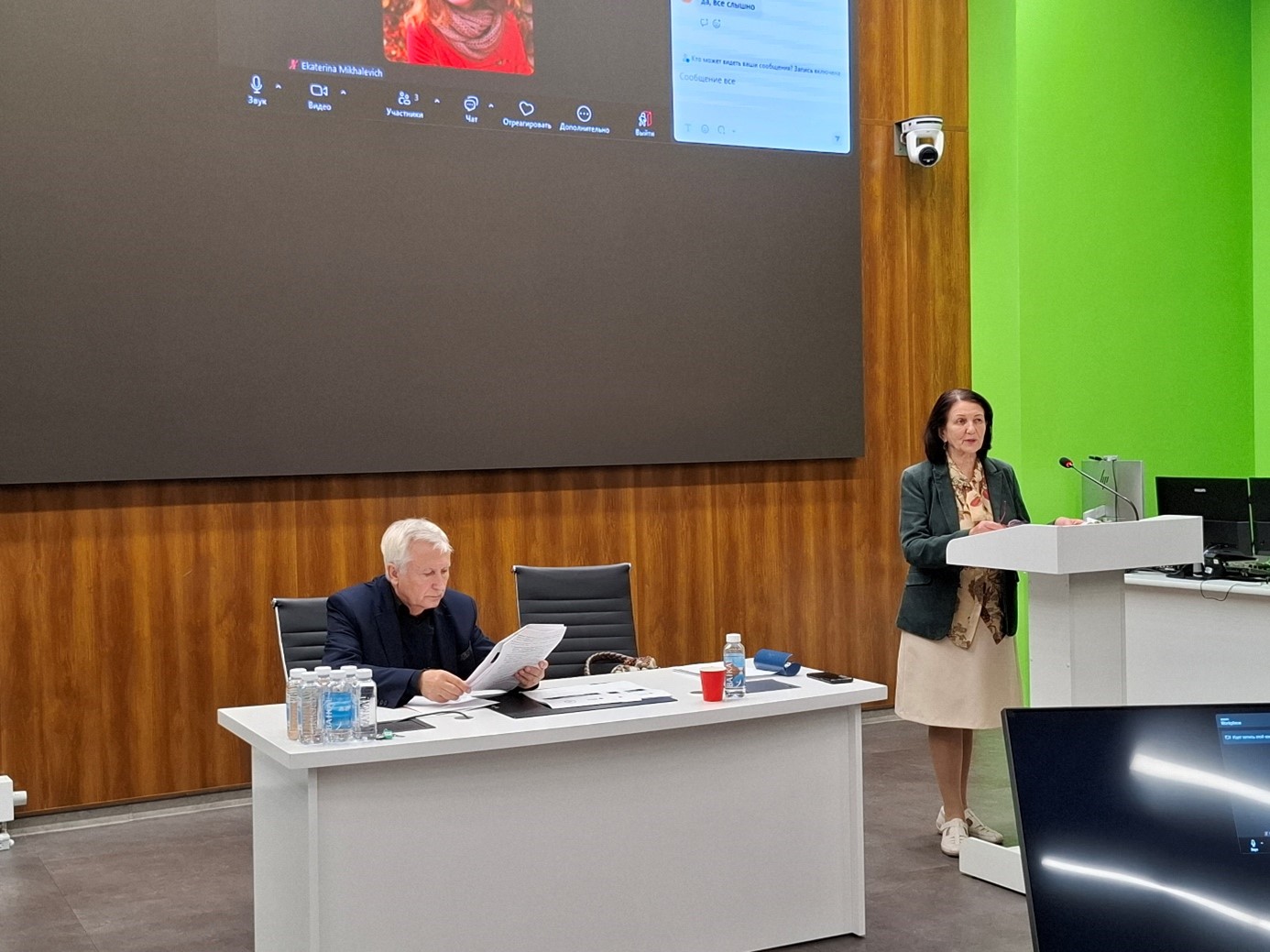
Panel moderators, Prof. Evgeny Pashentsev and Prof. Eleonora Barkova
In his introductory speech, Prof. Evgeny Pashentsev defined the scientific and practical task of the section: “The section is held as part of a series of events for the implementation of the Russian Science Foundation grant project “BRICS Strategic Communication in Global Governance”[1], and our presentations are aimed at assessing the opportunities and risks of using artificial intelligence in BRICS strategic communication in the conditions of global crisis.”
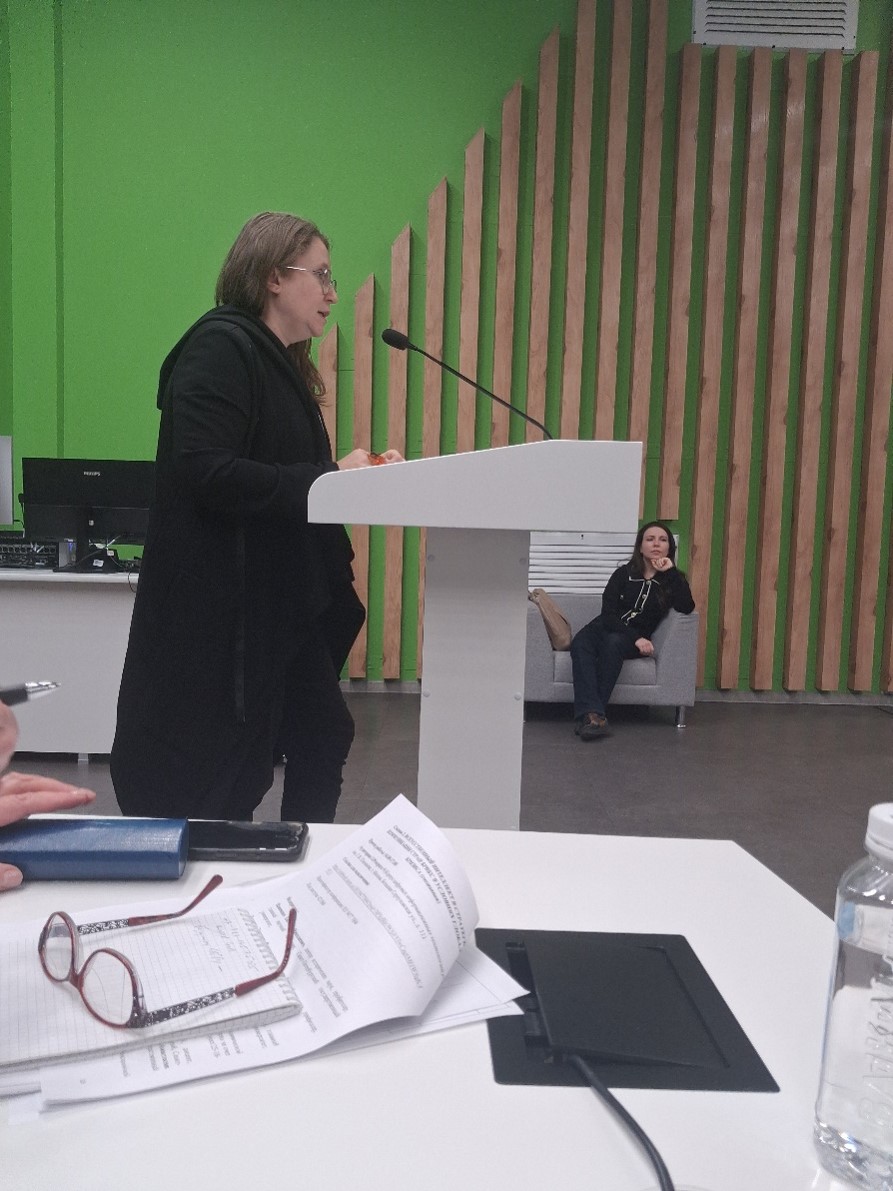
Prof. Daria Bazarkina’s report
The first speaker was Prof. Daria Y. Bazarkina, Chief Researcher at St. Petersburg State University, with the topic “Malicious use of artificial intelligence in political struggle: cases of the European Union and BRICS.” According to Prof. Bazarkina, “While the European Union is a key jurisdiction with advanced AI regulation, it demonstrates an extremely low level of AI technologies public approval. This vulnerability makes society susceptible to manipulation and disinformation about AI.” On the other hand, BRICS has a wealth of different resources for the development of AI and demonstrates a high level of acceptance of AI technologies (e.g., in China). However, BRICS faces objective contradictions (poverty, political tension both within and between individual participating countries), rendering the member countries population more vulnerable to AI-enhanced political manipulations. Based on extensive research material, Prof. Bazarkina demonstrated the ambiguity of the present situation: the EU case shows that the malicious use of AI in political struggle is an urgent problem of modern electoral processes, and BRICS demonstrates vulnerability in the framework of malicious use of AI, but technology giants (for example, China) promptly respond to digital challenges in the field of AI. The political struggle against the use of AI has become a global phenomenon, and the key recommendation for the BRICS countries in this context is to “avoid excessive control over the malicious use of generative technologies” by ensuring a social orientation of its use.
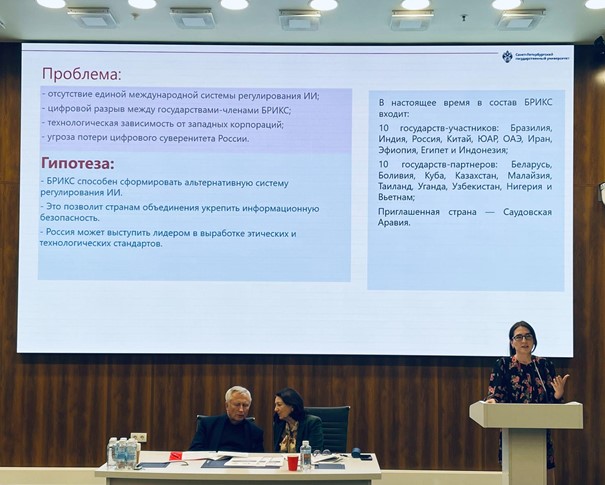
Ms. Anastasia Shcherban & Prof. Roman Vykhodets’s report
The next report, “Russia’s Initiatives in the field of International Information Security in the BRICS format,” was presented by Ms. Anastasia V. Shcherban, PhD Candidate at St. Petersburg State University, and Prof. Roman S. Vykhodets, DSC (Political Science), Associate Professor, Professor at the Department of Theory and History of International Relations at St. Petersburg State University. Ms. Shcherban noted that “Russia positions BRICS as a key alternative platform for developing standards in the field of AI and information security, which is a response to the dominance of NATO and Western countries in this area and part of a strategy to strengthen its own technological sovereignty.” The main challenges facing the BRICS are the lack of a unified international AI regulatory system, the digital divide between its members, technological dependence on Western corporations, and the danger of digital sovereignty loss. In the context of global digitalization, technological sovereignty is the cornerstone of Russia’s national security. Its main areas are the development of domestic software and IT infrastructure (import substitution) and the protection of critical information infrastructure (CII). The authors of the report identified specific initiatives of Russia within the framework of the BRICS, which are consistent with the task of preserving Russian technological sovereignty – standardization and regulation, institutional development, including the Memorandum of Cooperation in Science and Technology adopted in 2015 and the creation of an Alliance for the development of AI, aimed at deepening strategic communication, as well as the active promotion of the Code of Ethics in the field of AI. Russia has consistently integrated its national strategy of technological sovereignty into the BRICS multilateral agenda. “Through the promotion of specific initiatives, Russia seeks to form a competing global center of power within the framework of the association, capable of developing its own rules and standards in the field of AI and information security, alternative to Western approaches.”
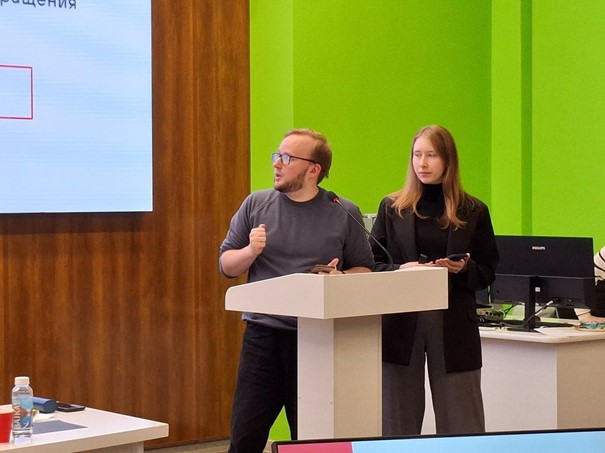
Dr. Oleg Kocherov & Ms. Sofia Mikushina’s report
Dr. Oleg S. Kocherov, Senior Researcher at St. Petersburg State University, and Ms. Sofia A. Mikushina, MA student at the State Academic University for the Humanities, prepared the report “Digital and intellectualized peacebuilding as a promising area of BRICS strategic communication.” According to Dr. Kocherov, “Due to the fragmentation of the international peace architecture, new norms and mechanisms in the field of peace and security are created mainly by regional and transregional organizations, and BRICS, designating political and security issues as one of the three main areas of cooperation, can play an important role here.” The analysis of Russian and Chinese approaches to peacebuilding shows their compatibility for cooperation in this area: Russia focuses on peacemaking as a tool for ensuring regional stability and multipolarity, while China emphasizes preventive diplomacy and post–conflict reconstruction. Although their AI use in peacebuilding is still limited, both countries are actively exploring its application in related areas (technological sovereignty and digital diplomacy in the Russian Federation, the AI+ initiative, global AI governance and regulation of its military applications in China). Within the framework of the BRICS, the most promising areas for AI-enhanced strategic communication in the sphere of peacebuilding are development of early-warning systems, analysis of conflict situations, mediation and the creation of new, non-Western peace indices, Ultimately, digital peacebuilding might become an important soft power tool for BRICS. The report concluded: “Digital and intellectualized peace-building is based on the principles of non-interference in internal affairs and protection of sovereign digital architecture. However, within the BRICS, there is a significant gap between the tech giants and other countries. The success of the initiative will depend on the ability to close this gap.”
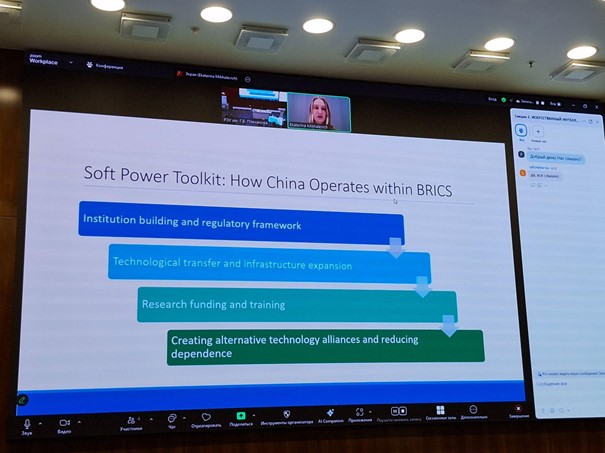
Ms. Ekaterina Mikhalevich’s report
The panel continued with the report “China’s strategy in the field of AI and the formation of an alternative technological agenda within the framework of the BRICS” prepared by Ms. Ekaterina A. Mikhalevich, PhD candidate at St. Petersburg State University. According to the report, China’s AI strategy is purposefully used as a soft power tool to advance the ideological agenda within the BRICS. “The key narrative is based on state-oriented pragmatism and criticism of Western techno-hegemony, with the claim that Western standards are not universal.” The toolkit includes the creation of a holistic ecosystem of influence through institution-building (protocol development, data security initiatives), infrastructure expansion (e.g., Huawei cloud services in South Africa), direct investment and training. However, the strategy faces serious challenges, including distrust between BRICS countires (banning Chinese apps in India) and internal restrictions (tight government controls), which undermine the attractiveness of the Chinese model. Thus, BRICS is becoming a testing ground for an alternative Chinese model of technological development, and in the coming decade this systemic struggle will determine the formation of the future global technological landscape.
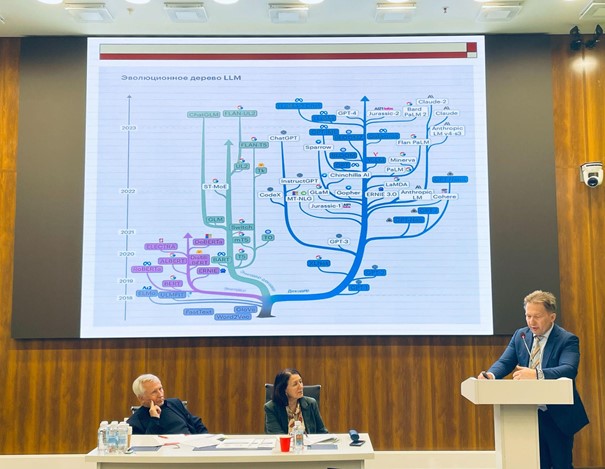
Prof. Konstantin Pantserev’s report
Prof. Konstantin A. Pantserev, Associate Professor, Chief Researcher at St. Petersburg State University, presented the report “Large language models as a tool for strategic communication: opportunities and risks for the BRICS countries.” As outlined by Prof. Pantserev, “Large Language Models (LLM), which marked a breakthrough in AI due to architecture and the ability to understand context, are becoming a critically important tool for strategic communication.” The main danger for the BRICS countries is that the “family tree” of these models is of exclusively US origin, which makes them a powerful tool for spreading narratives alien to many non-Western countries. The problem is further compounded by the LLM architecture as a “black box”, where the unchanging backbone of the model is hidden, and the training is conducted only at a superficial level. Prof. Pantserev concluded: “In this regard, it is necessary to create our own LLMs within the framework of the BRICS to promote an alternative agenda, which includes a set of measures for joint research and, most importantly, careful selection of high-quality texts for LLM training.”
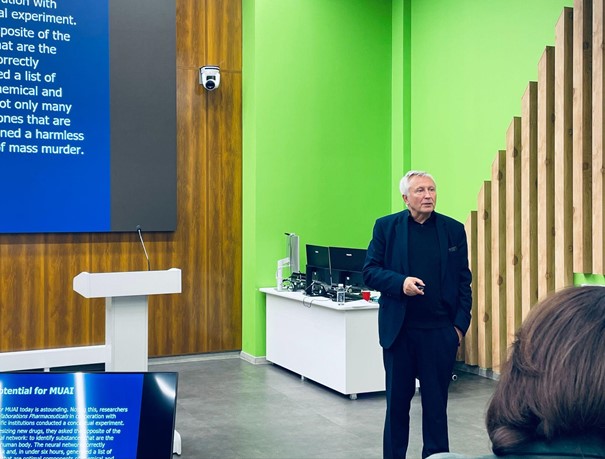
Prof. Evgeny Pashentsev’s report
Prof. Evgeny N. Pashentsev, DSc (History), Chief Researcher at St. Petersburg State University, continued the discussion of the US pedigree of AI in his report “Big Tech and Artificial Intelligence: current and future risks for BRICS”. “Big data and AI, controlled by the global technology giants of the United States (Big Tech), pose systemic threats to the BRICS countries. The analysis shows the ongoing formation of a “financial global empire” based on Big Tech, where even China is still largely a part of the technological chain dependent on the United States.” There is an exponential growth in the influence of corporations, their role in military conflicts and the lack of interest in regulating AI risks, which leads to a transition from a stable to an unstable world. As a solution, Prof. Pashentsev proposed to strengthen cooperation within the BRICS to develop mechanisms for enhancing technological sovereignty, including constant monitoring of Big Tech activities and the development of balanced approaches to AI regulation, which will compensate for the destabilizing impact of corporate control on international security.
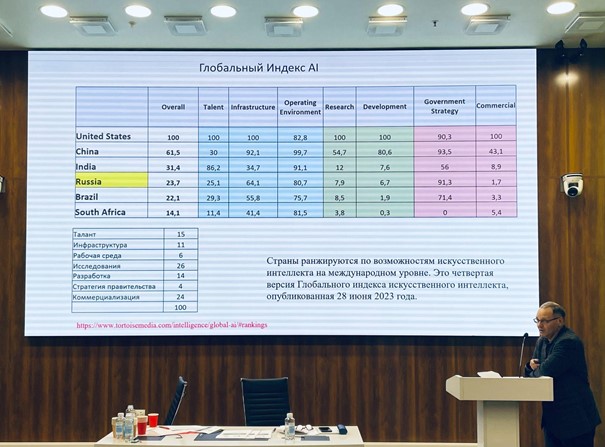
Dr. Daniel Petrosyants’s report
Dr. Daniel V. Petrosyants, Financial University under the Government of the Russian Federation, presented the report “Trends in the development of AI in BRICS countries: key areas of application.” Dr. Petrosyants’ report included an extensive statistical comparative analysis of the development of AI in the BRICS countries based on the Global AI Index (version 4, 2023), where there is a significant gap between the leader, China (61.5 points), and other countries: India (31.4), Russia (23.7), Brazil (22.1) and South Africa (14.1). The analysis of country specializations revealed a divergence in the priority areas of AI application: China demonstrates leadership in most sectors, including healthcare and education, while Russia focuses on computer vision, NLP, industry and defense, and Brazil and South Africa focus on socioenvironmental areas. “The analysis reveals the absolute dominance of Chinese universities in AI research within BRICS and highlights the need to develop common standards for the ‘hygiene’ of using AI to harmonize technology development among BRICS countries.”
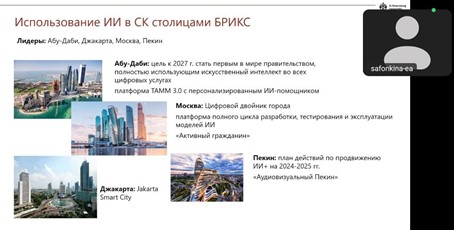
Ms. Elizaveta Safonkina’s report
Ms. Elizaveta A. Safonkina, Senior Researcher at St. Petersburg State University, continued with the report “Artificial intelligence in strategic communication of the BRICS capitals”. Ms. Safonkina explored the complex integration of AI into the strategic communication of BRICS countries capitals against the background of the projected growth of the global AI market to $1.77 trillion by 2032. The author highlights the key principles of shaping the BRICS agenda in this area, including focusing on the needs of the Global South, ensuring technology openness, and creating international standards under the auspices of the United Nations. Special attention is paid to the urban context, where BRICS capitals demonstrate record urban population growth rates, which actualizes the implementation of AI solutions for managing smart cities. Using the cases of Abu Dhabi (TAMM 3.0 platform), Moscow (digital twin), Beijing (AI+ program) and Jakarta (Jakarta Smart City), Ms. Safonkina analyzes the practices of using technology to interact with citizens and make management decisions, as well as emphasizes the associated risks – from errors in data interpretation to making malicious decisions. due to excessive trust in AI recommendations.
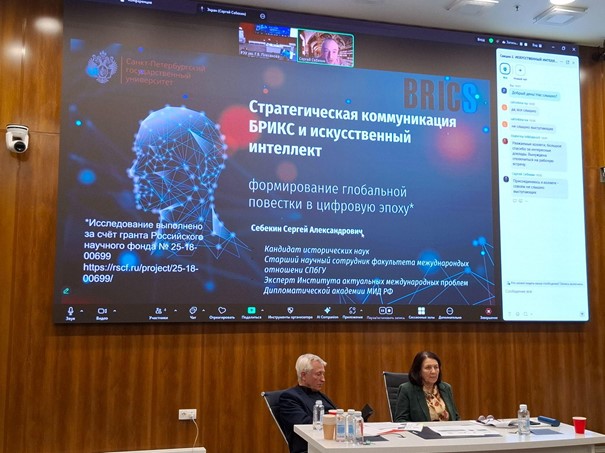
Dr. Sergey A. Sebekin’s report
Dr. Sergey A. Sebekin, Senior Researcher at St. Petersburg State University, explored the topic “BRICS Strategic Communication and Artificial Intelligence: Shaping the Global Agenda in the Digital Age.” According to Dr. Sebekin, “Strategic communication, being a key tool for achieving the goals of unification as a center of power, acquires the characteristics of multi-instrumentality, synchronization of actions and perception, where effectiveness is determined by the impact on the target audience.” The speaker identifies the dual nature of AI influence: on the one hand, technologies optimize the generation and personalization of strategic messages, increasing their relevance and speed of dissemination; on the other, they create systemic threats. The latter include the use of AI chatbots to impose narratives, disrupting the consistency of messages, manipulating audience perception, and, as a result, undermining trust in BRICS institutions. Dr. Sebekin concludes that BRICS countries need to develop measures to counter the malicious use of AI, which poses a non-trivial challenge to international security in the information and psychological sphere.
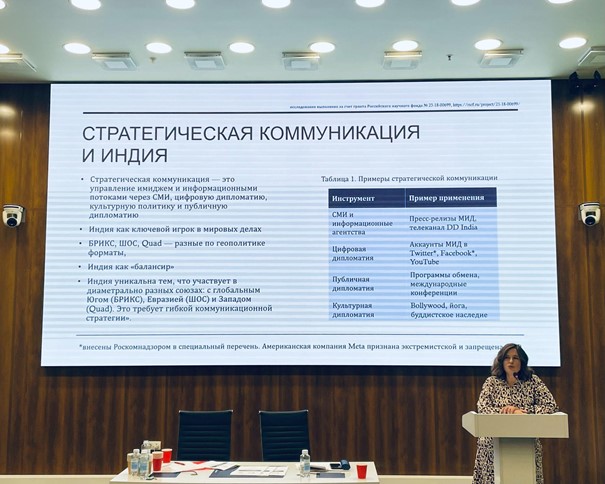
Dr. Olga A. Kharina’s report
Dr. Olga A. Kharina, Candidate of Political Sciences, St. Petersburg State University, investigated India’s AI agenda in the report “India’s role in shaping ethical standards for the use of artificial intelligence in strategic communications of the BRICS countries.” Dr. Kharina analyzes the role of India as a key agent in shaping ethical standards for the use of AI in BRICS strategic communication. The report emphasizes India’s unique status as a “balancer” that participates in diametrically opposed international formats, necessitating a flexible communication strategy. Dr. Kharina highlights the concept of “AI for All” as the methodological basis of the Indian approach, which combines the principles of digital humanism with an emphasis on the practical application of AI in the social sphere. The speaker also pays particular attention to India’s specific initiatives in BRICS, including best practice exchange programs and the development of standards for “trusted AI ecosystems.” “In conclusion, there are still some structural challenges associated with regulatory fragmentation, digital inequality and differences in the understanding of ethics among the participating countries, which complicates the development of unified regulatory approaches within the framework of the association.”
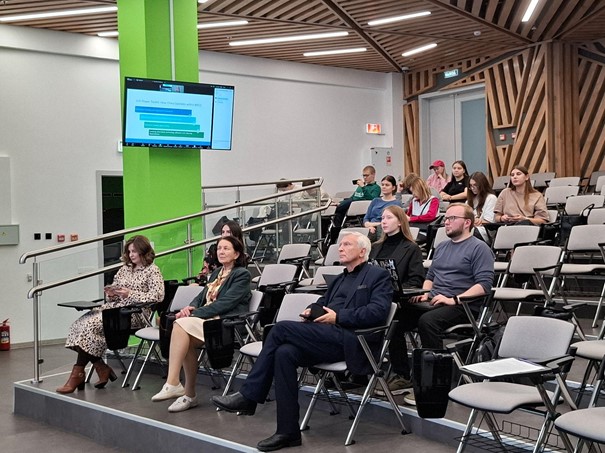
The panel concluded with the fruitful Q&A session. Prof. Pashentsev emphasized the priority of practical results over declarations in the field of strategic communication and AI, as well as the importance of analyzing specific applications of AI. He also highlighted the need to study the processes of integrating AI technologies into public administration systems and their transformative impact on the latter. According to Prof. Pashentsev, Russia demonstrates the effective use of AI. However, due to the ongoing special military operation, as well as the mostly closed nature of the Russian AI database, the actual level of development of AI technologies in Russia is not adequately reflected in international ratings which are based on open information. Prof. Pashentsev also emphasized the importance of a balanced assessment of achievements in the field of AI, without both their exaggeration and underestimation, and concluded that there is an abundant fertile ground for further research by BRICS scholars.
Prof. Barkova emphasized systematicity and complementarity of the reports presented in the framework of the section. In Prof. Barkova’s opinion, a promising area for coordinating the efforts of the BRICS countries is ecology, which can serve as a conceptual basis for harmonizing various national approaches to the development and regulation of AI.
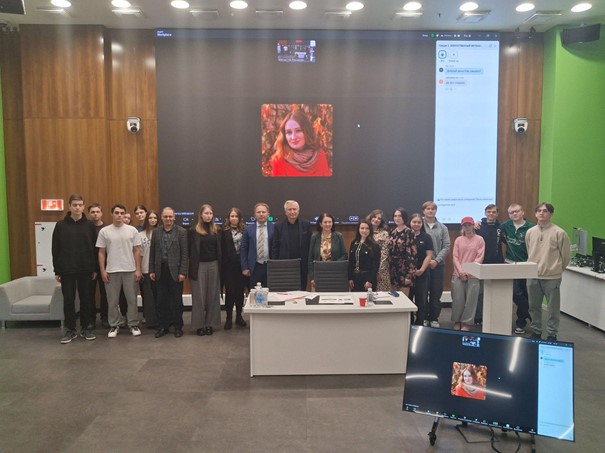
In conclusion, the panel “Artificial Intelligence and Spiritual Culture”, held as part of the second International Scientific and Practical Conference “Artificial Intelligence and Spiritual Culture” at the Plekhanov Russian University of Economics on October 23, highlighted that the formation of alternative models of regulation and application of AI within the framework of BRICS is a strategic response to the crisis of legitimacy of Western techno-hegemony. Ensuring technological sovereignty, overcoming the “black box effect” in large language models, and developing common standards based on the principles of multipolarity remain key challenges along this path. In this regard, there is an urgent need to move from declarations to practical cooperation, where an ecosystem approach and joint projects in such areas as ecology and data security can become a catalyst for the convergence of national strategies.
[1] Grant № 25-18-00699, https://rscf.ru/en/project/25-18-00699/



 0
0 613 Views
613 Views 8 November 2025
8 November 2025
